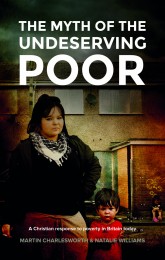 Do the poor deserve to be helped?
Do the poor deserve to be helped?
I have greatly enjoyed reading this book and strongly recommend it. My attitudes were challenged, and I was liberally marking and underling passagesas I read it. It has already caused me to adjust my thinking about a particular ‘live’ situation I am facing. Although the book is centred on the UK, its history and current situation, there are many Biblical and practical teachings that any reader can apply.
Poverty in Britain
Martin Charlesworth and Natalie Williams, two of the key players in the Jubilee+ initiative of the Newfrontiers family of churches in the UK, begin by laying a historical foundation. Taking the reader through the effects of the Poor Laws of 1601 and 1834 they trace how the relationship between church and state has waxed and waned through the centuries. They challenge the use of the terms ‘deserving’ and ‘undeserving’, the latter assuming that poverty is of people’s own making through idleness.
The 2nd world war and the associated austerity led to the recognition that supportive welfare was widely needed. The Beveridge Report of 1942, influenced greatly by the biblical perspectives of the then-Archbishop of Canterbury, William Temple, laid the foundation for the Welfare State. But beneficial as this has been it has blunted the expectation of taking personal responsibility and also divorced ‘welfare’ from being acknowledged as the domain of the church. Some within the church even encouraged this, seeing social involvement as a watering down of the gospel.
The book is helpfully supported by very recent research carried out by one of the authors. This reveals, among much else, that the media have a strong bias against the poor, one of the researchers voicing the opinion that many media outlets saw poverty as a ‘character defect’. The research also revealed that there is little opportunity for the poor themselves to have a voice in the media, thus making the issue of poverty also one of justice. This is an area in which the church has a particular responsibility to become advocates.
A Biblical case for radical mercy
How should the church be involved? From teaching in the Mosaic law and Jesus’ fulfilment of the Nazareth manifesto of Lk 4, the outworking of the Kingdom manifesto of Is 61, it is clear that God’s compassion is unconditional. Jesus healed all who come to him and taught that we should love our neighbours. So no-one is ‘undeserving’, although Paul cautions against helping people who are not willing to work and also widows who should primarily be cared for by their families. Jesus also shows the outworking of compassion and grace in his parable about hiring labourers through the day and paying the same amount to all.
Who are the poor?
The authors suggest that there are four categories of poverty: economic, relational, aspirational, spiritual. But these are not mutually exclusive. Nor are the reasons for poverty, categorised as exploitation, natural disaster, accident or, on occasion, one’s own wrong actions.
Developing a heart for the poor
Then comes the challenge to the reader as the authors address our attitudes. They urge us to hold tenaciously to six Biblical values: People – Do we judge and group them as categories rather than as individuals made in the image of God? Truth – don’t believe the stereotypes. Kindness, Mercy, Justice and Generosity.
A call to action
The book concludes with some considerations that will lead to action. Specifically that we should consider a prophetic lifestyle choice of simplicity – not austerity but at a level where materialism does not determine our decisions. Generosity: budget to allow for giving to the poor. Proximity: be willing to be close to the poor. Community: the church is privileged to be part of the community to reach out to help those in need. Strategy: influence on public policy, involvement in local politics etc. Expectancy with faith: we have more to offer than a social programme from the world. Be expectant that God will not only change circumstances but hearts.
Your response now
What a book! Buy it. Here is a link. Give it away (Christmas present!). Be prepared to be challenged!
